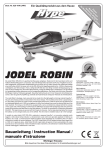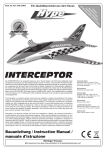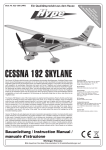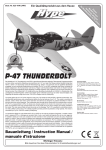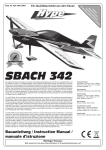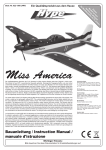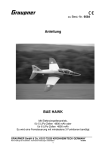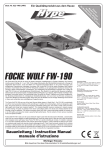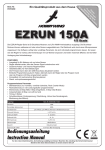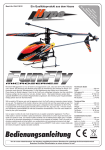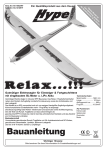Download Bauanleitung / Instruction Manual / manuale d'istruzione
Transcript
Der Acro Speed ist mit einem leistungsstarken 4s Antrieb ausgestattet, der senkrechtes Steigen in den Himmel ermöglicht. Dabei untermalt der Antrieb das Flugbild mit der dazu passenden Soundkulisse. Rumpf, Tragflächen und Leitwerk sind aus dem 100.000-fach bewährten Material HypoDur® gefertigt und verfügen über hohe Festigkeitswerte bei minimalem Gewicht. Die einteilige Tragfläche des Acro Speed ist aus einem härteren Material gefertigt und verfügt über mehrere Kohlefaser-Holme zur Verstärkung. Selbst die Querruder sind jeweils mit einem separaten Kohlefaser-Holm verstärkt, um ein Verwinden unter hoher Geschwindigkeit zu vermeiden. Unmittelbar neben den Querrudern sind sogenannte Speedfins angebracht, die die Steuerwirksamkeit der Querruder weiter erhöhen. The Acro Speed is the ultimate hotliner for high speed action! Fuselage, wings and tail are made from the lightweight and strong material HypoDur®. The one piece main wing features carbon fiber spars for reinforcement. The so called speedfins at the ailerons improve the steering reactions for rolling maneuvers. The 2.200kV brushless motor is powered by a 4s 14.8V LiPo battery and provides the ultimate flight performance to the Acro Speed. The control of the motor takes the proven SKYWALKER 40A UBEC controller made by HOBBYWING. All rudders are designed as gapless elastoflaps, which offer maximum aerodynamic efficiency. The model is supplied as ARF version with four built-in micro servos. The brushless motor and the speed controller are preassembled as well. Due to the high degree of prefabrication, it only takes few handles to get airborne. With the Acro Speed you will have the ultimate eyecatcher on your airfield…! n. re t s ein ne ah se k ig J ie t e 4 D ll is ge b 1 e g, r a od u le M lze ort ie p Sp ells od rM Ein Qualitätsprodukt aus dem Hause fü Best.-Nr. 029-1071 (ARF) Technische Daten Spannweite: 1.110 mm; Länge: 945 mm; Gewicht ca.: 930 g; Motor: Brushless Ø35x36mm 2.200kV Außenläufer; Akku: LiPo 4s 14,8V RC-Funktionen Höhenruder, Seitenruder, Querruder, Motor Technical Data Wingspan: 1.110 mm; Length: 945 mm; Weight approx.: 930 g; Motor: Brushless Ø35x36mm 2.200kV Outrunner; Battery: LiPo 4s 14,8V RC-Functions Elevator, Rudder, Aileron, Motor Caratteristiche tecniche apertura alare: 1.110 mm; lunghezza: 945 mm; peso circa.: 930 g; motore: Brushless Ø35x36mm 2.200kV; batteria: LiPo 4s 14,8V RC-Functions ITA piano di quota, direzionale, alettoni, motore Vada per l’Acro Speed e sperimenta la nuova dimensione della performance di volo ...! L’Acro Speed è il nuovissimo hotliner per un’elevata azione di velocità. Fusoliera, ali e coda sono realizzati con il materiale leggero e resistente HypoDur ®.Longheroni in fibra di carbonio rinforzano l’ala stampata in monoblocco. I cosiddetti speedfins agli alettoni migliorano le reazioni di guida per le manovre di rolling.Il motore 2.200kV brushless è alimentato da una batteria 4s LiPo 14.8V e offre ulteriori prestazioni si volo per l`Acro Speed. Il controllo del motore viene garantito dal collaudato regolatore SKYWALKER 40A UBEC, made by HOBBYWING. Tutti i timoni sono progettati come elastoflaps gapless, che offrono massimo rendimento aerodinamico. Il modello viene fornito in versione ARF con quattro micro servi montati. Il motore brushless e il regolatore di velocità sono anche preassemblati. Dato l'elevato grado di prefabbricazione, richiede solo poche manovre manuali per decollare.Con l’Acro Speed avrete il massimo eye-catcher sul vostro campo di volo...! Bauanleitung / Instruction Manual / manuale d'istruzione Wichtiger Hinweis: Bitte bewahren Sie diese Dokumentation für Ersatzteilbestellungen auf. 1. Inhaltsverzeichnis / Content / Indice 1. Inhaltsverzeichnis / Content / indice 2. Lieferumfang / Content / contenuto della confezione 3. Zusammenbau / Assembly / assemblaggio 4. Hinweise zur Bedienung / How To Use / l'utilizzo 5. Sicherheitshinweise / Safety Instructions / per la vostra sicurezza 6. Ersatzteile / Spare Parts / ricambi 7. Garantiebedingungen / Warranty / garanzia Seite 2 Best.-Nr. / Item-No. / art. 029-1071 2. Lieferumfang / Content / contenuto della confezione 1 - Rumpf / Fuselage / fusoliera 2 - Tragfläche / Main Wing / ala 3 - Höhenleitwerk / Horizontal Stab. / piano di quota 4 - Kabinenhaube / Canopy / cabina di pilotaggio 5 - Luftschraube / Propeller / elica 6 - Luftschraubenmitnehmer / Propeller Joint / trascinatore dell'elica 7 - Spinner / Spinner / ogiva Best.-Nr. / Item-No. / art. 029-1071 Seite 3 3. Zusammenbau / Assembly / assemblaggio Nehmen Sie das Höhenleitwerk zur Hand und biegen Sie das Ruder mehrmals vorsichtig hin und her, um dieses leichtgängig zu machen. / Take the horizontal stabilizer and move the control flap several times in order to make it run smoothly. / Prendere il piano di quota e muovere alcune volte le parti mobili per farli andare scorrevolmente. Stellen Sie die Anlenkung für das Höhenruder her, wie dargestellt. / Install the linkage for the elevator as shown. / Installare il comando del piano di quota come mostrato in foto. Anschließend das Höhenleitwerk auf den Rumpf aufsetzen und von unten mit der Schraube M4x35 mm sichern. / Put the horizontal stab on the fuselage and fix it with the screw M4x35mm. / Ora montare il piano di quota sulla fusoliera e fissare con la vite M4x35 mm. Gabelkopf / Clevis / forcella 3. Loch / 3rd hole / 3° foro Höhenruder / Elevator / piano di quota Ruderhorn Control Horn squadretta Montieren Sie nun die Luftschraube und den Spinner, wie dargestellt. Luftschraube gut festziehen! / Install the propeller and spinner as shown. Tighten the propeller firmly! / Montare l'elica e l'ogiva come mostrato in foto. Serrare bene l'elica! Seite 4 Best.-Nr. / Item-No. / art. 029-1071 Schließen Sie die Servos am Empfänger an und verlegen Sie anschließend die Empfängerantenne(n). Beachten Sie hierzu auch die Herstelleranweisungen der RCAnlage! / Connect the servos to the receiver and install the antenna(s) in the model. Please note the manual from the radio manufacturer accordingly. / Collegare i servi alla ricevente e poi stendere l'antenna(e) della ricevente. Fate riferimento alle istruzioni del produttore della radio. Anschließend den Empfänger unterhalb der Tragflächenaufnahme in hinteren Teil des Rumpfes montieren. / Install the receiver underneath the main wing in the rear part of the fuselage. / Ora montare la ricevente sotto l'ala nella parte posteriore della fusoliera. Verbinden Sie die beiden Querruderservos mit dem Empfänger und setzen Sie die Tragfläche auf den Rumpf auf. Sichern Sie die Tragfläche mit den beiden Schrauben M4x20mm (hinten, Pos. 1) und M4x28mm (vorn, Pos. 2). / Connect the aileron servos to the receiver and put the main wing on the fuselage. Secure the wing by using the two screws M4x20mm (rear, Pos. 1) and M4x28mm (front, Pos. 2). / Collegare i due servi degli alettoni con la ricevente e montare l'ala sulla fusoliera. Fissare l'ala con le viti M4x20mm (dietro, Pos. 1) e M4x28mm (davanti, Pos. 2) Best.-Nr. / Item-No. / art. 029-1071 Seite 5 Setzen Sie nun den Antriebsakku (4s LiPo 14,8V / 2.100mAh) in das Akkufach ein. Dazu den Akku durch den Kabinenhaubenausschnitt nach hinten unter die Tragfläche schieben. Akku jetzt noch nicht am Regler anschließen! / Install the battery (4s LiPo 14,8V / 2.100mAh) in the fuselage. Push the battery through the opened canopy hatch under the main wing. Do not connect the battery with the speed controller now! / Installare la batteria (4s LiPo 14,8V / 2.100mAh) nella fusoliera. Far slittare la batteria attraverso la cabina aperto verso la parte posteriore sotto l'ala. Einbauposition Akku Place of battery posizione batteria Stellen Sie die maximalen Ruderausschläge gemäß der nachfolgenden Werte ein. / Adjust the maximum travel of the control flaps according to the sketch below. / regolare le escursioni massime dei piani mobili come segue: HÖHENRUDER ELEVATOR PIANO DI QUOTA 12mm 12mm SEITENRUDER RUDDER DIREZIONALE 25mm 25mm QUERRUDER AILERON ALETTONI 13mm 13mm Die Werte werden an der Hinterkante der Ruder gemessen. Geben Sie auf alle Funktionen 40% ExponentialAnteil. / The values are measured at the rear edge of the flaps. Set 40% Exponential on all functions. / Si misura al bordo posteriore delle parti mobili. Date 40% di esponenziale su entrambi funzioni. Setzen Sie abschließend die Kabinenhaube auf den Rumpf auf. / As the last step put the canopy on the fuselage. / Ora mettere la cabina sulla fusoliera. Akku mit Klettband oder Schaumstoff sicher im Modell befestigen. Die endgültige Position des Akkus ergibt sich bei der Justierung des Schwerpunktes. / Use some velcro tape or foam in order to secure the battery safely. The final position of the battery will be found when checking the CG. / Fissare la batteria bene con del nastro velcro: la posizione finale della batteria sarà determinata successivamente quando andrete a controllare il baricentro. Prüfen Sie nun, ob sich alle Ruder korrekt bewegen. Zuerst(!) den Sender einschalten, danach den geladenen Antriebsakku im Modell anschließen. Betätigen Sie der Reihe nach alle Funktionen am Sender. Vorsicht im Umgang mit dem drehenden Propeller! / Check the function of all rudders. Switch on the transmitter first(!) and connect then the LiPo-Battery to the speed controller in the model. Move all rudders one by one. Attention! Be careful with the rotating propeller! / Verificate ora che tutte le parti mobili si muovano correttamente: accendere la trasmittente e collegare la batteria caricata nel modello. Ora provare tutte le funzioni radio. Attenzione a non ferirvi con il propeller in rotazione! Beim Ausschalten stets zuerst das Modell und dann den Sender ausschalten. / Always switch off the model first, then switch off the transmitter. / Per spegnere spegnete sempre prima il modello e poi la trasmittente! Seite 6 Best.-Nr. / Item-No. / art. 029-1071 Abschließend muss der Schwerpunkt am Modell überprüft werden. Dazu werden alle Komponenten (auch der Akku!) im Modell montiert. Der Schwerpunkt liegt 68 mm hinter der Nasenleiste der Tragfläche. Unterstützen Sie das Modell mit zwei Fingern exakt an diesen Punkten und beobachten Sie, wie das Modell auspendelt. Die Nase des Modells sollte sich leicht nach unten neigen. Dann ist der Schwerpunkt optimal justiert. / Before the first flight you have to check the center of gravity. For doing so you have to mount all components (also the battery!) in to the model. The CG is placed 68 mm behind the nose cone of the main wing. Support the model exactly at the marked spots on the bottom side of the wing. Put the model on two fingers and watch the fuselage. The nose should point slightly to the ground. Then the CG is placed correctly! / Verificare il centro di gravità. Dovrete usare il modello completo della batteria! Il CG è a 68 mm dietro il bordo d'entrata dell'ala. Tenere il modello tra due dita come mostrato e guardate la fusoliera. Il muso dovrebbe puntare leggermento verso il basso. 68 mm Unbedingt darauf achten, dass das Modell aus der waagerechten(!) Position heraus die Nase nach unten nimmt! Keep the model exactly(!) in horizontal position, before it takes down the nose! Attenzione: il modello deve essere tenuto perfettamente orizzontale prima che punta il muso verso il basso!! Best.-Nr. / Item-No. / art. 029-1071 Seite 7 Seite 8 Best.-Nr. / Item-No. / art. 029-1071 4. Hinweise zur Bedienung / How To Use / istruzioni d'uso 4.1 Laufrichtung der Ruder / Steering Direction Of Flight Controls / direzione dei piani mobili Vor dem Erstflug des Modells muß unbedingt die Laufrichtung aller Ruder überprüft werden. / Before the first flight of the model, the steering direction must be checked carefully! / prima del primo volo dovrete controllare il senso di escursione dei piani mobili Höhenruder / Elevator / piano di quota Wird der Höhenruderknüppel am Sender nach hinten gezogen, muß das Höhenruder nach oben ausschlagen. Wird der Höhenruderknüppel nach vorn gedrückt, muß das Höhenruder nach unten ausschlagen. / When you pull the elevator stick, the elevator has to move up, the model will climb. When you push the elevator stick, the elevator has to move down, the model will decline. / Tirando lo stick del piano di quota, il piano mobile deve andare in sù, spingendolo in avanti, il piano deve andare giù. Seitenruder / Rudder / direzionale Das Modell wird von hinten betrachtet. Wird der Seitenruderknüppel am Sender nach links bewegt, muß das Seitenruder nach links ausschlagen. Entsprechend umgekehrt erfolgt der Ausschlag für die andere Richtung. / Take a look to the model from behind. When you move the rudder stick to the left, the rudder has to move to the left. For the right side it works accordingly. /Guardare il modello da dietro: muovendo lo stick del direzionale a sinistra, il piano mobile si muove a sinistra e vice versa. Querruder / Aileron / alettoni Das Modell wird von hinten betrachtet. Wird der Querruderknüppel am Sender nach links bewegt, muß die linke Querruderklappe nach oben und die rechte Querruderklappe nach unten ausschlagen. Entsprechend umgekehrt erfolgen die Ausschläge für die andere Richtung. / Take a look to the model from behind. When you move the aileron stick to the left, the left flap has to move up and the right flap has to move down. For the right side it works accordingly. / Guardando il modello da dietro e muovendo lo stick degli alettoni a sinistra, l'alettone sinistra deve andare sù e quello destro in giù. E vice versa. Motor / Motor / motore Wird der Gasknüppel in die Leerlauf Position gebracht, muß der Motor stillstehen. Bei Vollgas muss der Motor seine maximale Drehzahl erreichen. / When you move the throttle stick to idle, the motor has to stop completely. Putting the throttle stick to full power, the motor has to reach its maximum rpm. / Portando lo stick motore in posizione minimo, il motore si deve fermare, in posizione massima invece deve andare ai massimi giri. 4.2 Startvorgang / Take Off / partenza • Starten Sie prinzipiell immer gegen den Wind! / Alwas start the model against the wind! / Partite sempre contro il vento. • Überprüfen Sie die Funktion aller Ruder vor jedem(!) Start. / Check all rudder controls before each(!) start. / Controllate tutti i piani mobili prima della partenza. • Geben Sie Vollgas und korrigieren Sie in Bodennähe nur mit kleinen Steuerausschlägen. / For take off always use maximum power. When you are near the ground only small control action is recommended. / Per la partenza accelerare al massimo. • Steigen Sie in einem flachen Winkel. / Climb in a smooth angle. / Salire in un angolo piatto. 4.3 Landevorgang / Landing Procedure / Atterraggio • Drosseln Sie den Motor und fliegen Sie in 30 m Entfernung mit Rückenwind parallel zur Landebahn. / Reduce motor power and fly parallel to the runway in a distance of 30 meters. / Diminuire i giri motore e volare a 30 m di distanza parallelamente alla pista di atterraggio. • Fliegen Sie eine 90° Kurve in Richtung Landebahn und bauen Sie Höhe ab. / Turn 90° to the runway and decline continously. / Effettuate ora una virata a 90° in direzione della pista di atterraggio e diminuite la quota. • Fliegen Sie erneut eine 90° Kurve, Sie fliegen nun direkt auf die Landebahn zu. Turn again 90° to the runway and decline continously. You are now approaching the runway. / Effettuate un'ulteriore virata a 90° in direzione della pista e continuate a scendere. • Lassen Sie das Modell weiter sinken bis das Modell 1 m über der Landebahn schwebt. / Decline until you are about 1 meter over the runway. / Continuate la discesa fino a librarvi 1 m sulla pista. • Ziehen Sie den Höhenruderknüppel etwas stärker und halten Sie ihn gezogen. / Pull the elevator carefully and keep it pulled. / Tirate lo stick del piano di quota un po' di più e tenetelo tirato. • Je mehr sich das Modell dem Boden nähert, desto mehr muß der Höhenruderknüppel gezogen werden. Da das Modell ständig langsamer wird, setzt es sich praktisch von allein auf die Landebahn. / The closer you come to the ground the more you have to pull the elevator. As the model gets slower, it will land more or less automatically. / Più vi avvicinate al suolo, più dovrete tirare il piano di quota. Il modello rallenta continuamente atterrando praticamente da solo sulla pista. Best.-Nr. / Item-No. / art. 029-1071 Seite 9 5. Sicherheitshinweise / Safety Instructions / avviso di sicurezza Allgemeine Sicherheitshinweise für Modelle mit Elektroantrieb Dieses Modell ist kein Spielzeug, geeignet für Modellsportler ab 14 Jahren. Verwenden Sie das fertige Modell ausschließlich gemäß seiner vorgesehenen Bestimmung, wie unter dem Kapitel „Hinweise zur Bedienung“ in der Bauanleitung / Bedienungsanleitung erläutert. Montieren Sie das Modell grundsätzlich nur nach der Bauanleitung / Bedienungsanleitung zusammen. Nehmen Sie Umbauten nur vor, unter Verwendung von empfohlenen original Ersatz- und Tuningteilen aus dem Hause KYOSHO Deutschland. Beachten Sie hierzu die Gebrauchsanweisung anderweitig zur Anwendung kommender Komponenten (z.B. Fernsteuerungsanleitung). Die Inbetriebnahme ist nicht eher gestattet, bis das Modell laut beiliegender Bauanleitung komplett montiert ist. Überprüfen Sie vor der Inbetriebnahme des Modelles die Funktionssicherheit laut Checkliste und benutzen Sie einen Frequenzkanal, der nicht bereits von anderen Modellsportlern belegt ist oder diese stört. Betreiben Sie das Modell nur dort, wo sich keinerlei Personen oder Tiere aufhalten und eine Beschädigung anderer Güter auszuschließen ist. Handeln Sie eigenverantwortlich und überprüfen Sie das gewählte Gelände vor Inbetriebnahme des Modells auf seine Eignung. Stoppen Sie das Modell unverzüglich bei einer Störung und beseitigen Sie sofort die Ursache, falls Sie keine Kontrolle mehr über das Modell haben. Berühren Sie keine rotierenden und/oder heißen Motorteile während des Betriebes oder der Abkühlphase. Warten Sie Ihr Modell nach jedem Einsatz und ersetzen Sie Verschleißteile, um einen sicheren Betrieb zu gewährleisten. Fassen Sie das Modell während und nach dem Betrieb stets so an, daß Sie keinesfalls mit Teilen des Antriebs in Berührung kommen. Bedenken Sie, daß Kunststoffteile bei niedrigen Außentemperaturen in Ihrer Schlagzähigkeit nachlassen können, daß heißt, die Belastungsfähigkeit sinkt. Sofern Sie nicht über ausreichende Kentnisse im Umgang mit Funktionsmodellen verfügen, wenden Sie sich an einen erfahrenen Modellsportler oder Modellbauclub. Schützen Sie sich bei Testläufen vor, eventuell durch rotierende Teile, aufgewirbeltem Schmutz bzw. Steinchen. Schützen Sie alle elektrischen Komponenten vor Wasser und Fremdkörpern. Sorgen Sie dafür, daß der Motor nicht überlastet oder blockiert wird. Lassen Sie den Motor nach dem Betrieb ausreichend abkühlen. Laden und entladen Sie Ihre Akkus sorgfältig und achten Sie darauf, daß die Akkus und Anschlußkabel keinerlei Beschädigungen aufweisen. Schließen Sie den Akku niemals "kurz" durch Zusammenführen des Plus- und Minuspols. Verlegen Sie die Kabel im und am Modell so, daß diese nicht in oder an rotierende oder heiße Teile geraten. Stellen Sie sicher, daß der Fahrtenregler ungehindert funktionieren kann. CE-Zertifizierung für Elektromotor; Angewandte Normen: EN 50081-1, IEC 1000-4-2, IEC 1000-4-3, EN 50082-1 Bei technischen Rückfragen, wenden Sie sich bitte an unsere Service-Hotline: 04191-932678 (Mo.-Do.: 14.00-17.30 Uhr). Seite 10 Best.-Nr. / Item-No. / art. 029-1071 General Safety Instructions For Electric Models This model is not a toy. Allowed for children over 14 years. Use the model accordingly to chapter 5 "How To Use" in this instruction manual. Assemble the model accordingly to this instruction manual. Do not alter or modify the model. Only use parts that are officially recommended by KYOSHO Deutschland. Always pay close attention to the manuals that are included to accessory parts. Do not fly the model before you have finished the assembly completely according to this manual. Before you fly, check all functions of the model carefully. Check if your frequency is clear and not used by any other pilots in your area. This may cause radio interference. Never fly your model near other human beings, animals or other obstacles. You are responsible for flying the model, so you have to check carefully your flight area. Stop flying immediately if you realize any radio interference. Check the system for the cuase and change the frequency if necessary. Do not touch any moving or hot motor parts during action! Let all components cool down before you handle them. Check your model carefully after each flight. Replace parts if they are worn out or if they are defective. Keep your hands out of reach from rotating or hot parts of the model. Keep in mind that plastic parts easily break under cold temperature conditions. If you are a novice in flying you should ask experienced pilots for assistance during your first flights. Protect yourself from dust and other small things when you test run your propeller drive on the ground. Keep all electronic components dry and clean! Take care that your motor does not get overload or gets blocked under full power. Let the motor cool down after restarting the model again. Charge your batteries carefully. Always watch the charging process and make sure all connectors are in good conditions. Do not shorten the battery by connecting the pluspole with the minuspole directly! Make sure that the wires do not touch rotating or hot parts of the model. CE-certification for electric motor: EN 50081-1, IEC 1000-4-2, IEC 1000-4-3, EN 50082-1 In case of technical questions please contact our helpdesk by phone: +49-4191-932678 or by e-mail: [email protected] Best.-Nr. / Item-No. / art. 029-1071 Seite 11 5. Sicherheitshinweise / Safety Instructions / avviso di sicurezza questo modello non è un giocattolo, è adatto a persone di età non inferiore ai 14 anni non usare i modelli per scopi diversi da quelli previsti nelle istruzioni montare il modello seguendo le istruzioni, per modificarlo usare esclusivamente modifiche (tuning parts) originali della casa Kyosho Deutschland GmbH, usare solo ricambi originali. per quanto concerne accessori di altri produttori (radiocomando etc.) seguire le istruzioni del rispettivo produttore non è permesso di usare il modello finchè il montaggio non è completato secondo le istruzioni prima di mettere in moto il modello, effettuare i controlli suggeriti nelle istruzioni e accertarvi che la vostra frequenza radio non sia già in uso da parte di un’altro modellista presente sul campo usare il modello solo in luoghi sicuri, dove non si trovano nè persone nè animali nè oggetti che potreste mettere in pericolo. Siete pienamente responsabili per eventuali danni recati dal vostro modello. se si dovesse verificare un’interferenza, fermare subito il modello e risolvere il problema state attenti a non toccare parti calde (motore, silenziatore, batteria motore) o parti rotanti del modello, controllate tutte le parti del modello dopo ogni uso e sostituite parti che mostrano segni di logoramento. assicuratevi di non venire a contatto - durante e dopo l'uso - con parti della propulsione e trasmissione a temperature basse, le parti in plastica perdono di resistenza e diventano più fragili se siete un neofita, chiedere aiuto ad un modellista esperto. proteggetevi da polvere, pietre etc. alzate dalle parte in rotazione proteggete l'elettronica contro le infiltrazioni di acqua e corpi estranei provvedete a non sovvraccaricare il motore e a non bloccarlo fare raffreddare il motore dopo l'uso caricate con cura le batteria e controllate periodicamente che i cavi di collegamento siano integri non mettere in corto circuito la batteria mettendo a contatto il polo negativo con quello positivo. i cavi elettrici nel modello NON devono venire a contatto con parti in rotazione o con parti calde assicuratevi che il regolatore di giri possa funzionare senza problemi e impedimenti certificazione CE del motore elettrico; norme applicate: EN 50081-1, IEC 1000-4-2, IEC 1000-4-3, EN 50082-1 Per info tecniche potete rivolgervi a [email protected]. Seite 12 Best.-Nr. / Item-No. / art. 029-1071 SICHERHEITSINFORMATIONEN ZU DEN IM MODELL ENTHALTENEN LITHIUM- POLYMER AKKUS UND LADEGERÄTEN 1. Allgemein • Lithium-Polymer (kurz: LiPo) Akkus bedürfen besonderer Aufmerksamkeit • Fehlbehandlung bei Ladung und Entladung können zu Feuer, Rauchentwicklung, Explosionen und Vergiftung führen. • Die Nichtbeachtung von Anleitungs- und Warnhinweisen kann zu Leistungseinbußen oder sonstigen Defekten führen. • Die unsachgemäße Lagerung bei zu hohen oder zu niedrigen Temperaturen kann die Kapazität verringern. 2. Ladung • LiPo-Akkus stets nur auf einer nicht brennbaren, hitzebeständigen und nicht leitenden Unterlage laden. • Leicht entzündliche Gegenstände von der Ladeanordnung fernhalten. • Ladevorgang stets nur unter Aufsicht. • Nur das beiliegende oder ein von uns ausdrücklich zur Ladung des Akkus dieses Modells freigegebenes Ladegerät verwenden. • Spannungen von über 4,20 V pro Zelle führen zu dauerhafter Beschädigung der Zelle und können Feuer, Rauchentwicklung und Explosion zur Folge haben. • Akku nicht verpolen! Andernfalls laufen anormale chemische Reaktionen ab, die den Akku zerstören und sogar zu Feuer, Rauchentwicklung oder Explosion führen können. 3. Entladung • Der Entladestrom darf 8C (= 8-fache Nennkapazität) nicht überschreiten. • Nicht unter 2,5 V pro Zelle entladen, andernfalls wird Zelle dauerhaft geschädigt. • Betrieb sofort einstellen, wenn Leistung des Modells stark abfällt. • Kurzschlüsse und hohe Temperaturen (max. 70°C) vermeiden, da sonst Gefahr der Selbstentzündung des Akkus; Temperatur ggf. mit unserem HYPE Infrarot Thermometer überprüfen. 4. Beschädigung des Gehäuses und der Folie • Gehäusefolie vor Beschädigung durch scharfe Gegenstände schützen. • Beschädigungen der Folie machen den Akku unbrauchbar • Akku verformsicher in das Modell einbauen, auch im Falle eines Absturzes oder Crashs • Temperaturen über 70°C können das Gehäuse beschädigen, so dass Elektrolyt austreten kann. In diesem Fall wäre der Akku unbrauchbar und zu entsorgen. 5. Beschädigte Zellen • Keine Weiterverwendung von beschädigten Zellen ! • Kennzeichen beschädigter Zellen: Verformung, beschädigte Folie, Geruch oder Auslauf von Elektrolyten • Gesetzliche Entsorgungsvorschriften (Akku = Sondermüll) beachten 6. Warnhinweise • Nicht ins Feuer werfen ! • Nicht in Flüssigkeiten jeglicher Art eintauchen; jeglichen Kontakt mit Flüssigkeiten vermeiden. • Außerhalb der Reichweite von Kindern lagern. • Akku nicht demontieren, Gefahr von Feuer, Rauch und Explosion sowie Verätzungen. • Jeglichen Kontakt mit Elektrolyt vermeiden. Sofern doch Kontakt aufgetreten sein sollte, sofort mit viel frischem Wasser abspülen und den Arzt konsultieren. • Bei Nichtbenutzung des Modells den Akku immer entnehmen und vor Inbetriebnahme rechtzeitig aufladen. • Lagerung nur auf einer hitzebeständigen, nicht brennbaren und nicht leitenden Unterlage. • Tiefentladene Akkus nicht weiter verwenden. 7. Garantieausschluß • Da durch uns die richtige Ladung und Entladung des Akkus nicht überwacht werden kann, wird jegliche Garantie vorsorglich ausgeschlossen. 8. Haftungsausschluß • Da wir weder die Einhaltung der Montage- und Betriebsanleitung in Zusammenhang mit dem Modell, noch die Bedienung und Methoden bei Installation, Betrieb, Verwendung und Wartung des Modells nebst zugehöriger Elektronik überwachen können, übernehmen wir keinerlei Haftung für Verluste, Schäden oder Kosten, die sich aus der fehlerhaften Verwendung und dem Betrieb ergeben oder in irgendeiner Weise damit zusammenhängen. • Ausdrücklich lehnen wir auch jegliche Folgeschäden, die sich im Zusammenhang mit Installation, Betrieb, Verwendung und Wartung des Modells ergeben, ab. • Soweit vom Gesetzgeber nicht anders vorgeschrieben, ist unsere Verpflichtung zur Leistung von Schadenersatz – gleich aus welchem Rechtsgrund – auf den Rechnungswert der an dem schadenstiftenden Ereignis unmittelbar beteiligten Warenmenge begrenzt. Dies gilt nicht, sofern wir nach zwingenden gesetzlichen Vorschriften wegen Vorsatz oder grober Fahrlässigkeit unbeschränkt haften. Best.-Nr. / Item-No. / art. 029-1071 Seite 13 IMPORTANT SAFETY INSTRUCTIONS AND WARNINGS FOR LITHIUM-POLYMER-BATTERIES 1. General Guidelines and Warnings • LiPo batteries are NOT charged as you receive them. They contain approximately 50% of a full charge as recommended for shipment and long term storage . • Use Lithium Polymer specific chargers only. Do not use a NiCd or NiMh charger - Failure to do so may cause a fire, which may result in personal injury and property damage. • Never charge batteries unattended. When charging LiPo batteries you should always remain in constant observation to monitor the charging process and react to potential problems that may occur. • Some LiPo chargers on the market may have technical deficiencies that may cause them to charge LiPo batteries incorrectly. It is solely the responsibility of the user to assure that the charger used works properly. • If at any time you witness a battery starting to balloon or swell up, discontinue the charging process immediately. Disconnect the battery and place it in a safe observation area for approximately 15 minutes. Continuing to charge a battery that has begun to swell will result in fire. • Battery observation should occur in a safe area outside of any building or vehicle and away from any combustible material. The middle of a cement driveway is a good example of a safe observation area. • Shorts can cause fires! If you accidentally short the wires, the battery must be placed in a safe area for observation for approximately 15 minutes. Additionally, be mindful of the burn danger that may occur due to a short across jewelry (such as rings on your fingers). • Chemical reactions are not instantaneous, a battery that has been shorted may not ignite for 10 minutes. • All crash batteries, even if not deformed, should be placed in a safe area for observation for at least 15 minutes. • If for any reason you need to cut the terminal wires, cut each wire separately, ensuring the wires do not become shorted across the cutting tool. 2. Charging Process • Make a visual inspection of the pack. Checking for any damaged leads, connectors, broken/cracked shrink covering, puffiness or other irregularities. • Before installing or changing the connector, check the voltage of the pack using a digital voltmeter. All new packs ship at approximately 3.80V to 3.9V per cell. For example: A 2S pack should read approximately 7.60V to 7.8V, A 3S pack should read approximately 11.40V to 11.7V etc • If any damage to the pack or leads is found, or the voltage is significantly less for your pack than specified above, do not attempt to charge or fly the pack; contact AG Power directly as soon as possible. • Never charge batteries unattended. • Charge in an isolated area, away from flammable materials. • Let the battery cool down to ambient temperature before charging. • Do not charge battery packs in series. Charge each battery pack individually. Overcharging of one or the other battery may occur resulting in fire • When selecting the cell count or voltage for charging purposes, select the cell count and voltage as it appears on the battery label. Selecting a cell count or voltage other than the one printed on the label may result in overcharging and fire. As a safety precaution, please confirm that the information printed on the battery is correct. For example: If a battery label indicates that it is a 3 cell battery (3S), it's voltage should read between 11.4 and 11.7 volts. This battery must be charged as a 3 cell battery (peak of 12.6V). • You must check the pack voltage after each flight before re-charging. Do not attempt to charge any pack if the unloaded individual cell voltages are less than 3.3V. For example: Do not charge a 2-cell pack if below 6.6V Do not charge a 3 cell pack if below 9.9V • NORMAL CHARGING: The charge rate should not exceed 1C (one times the capacity of the battery, unless otherwise noted*). Higher setting may cause problems which can result in fire. For example: Charge a 730 mAh battery at or below 0.73Amps. Charge a 5000 mAh battery at or below 5Amps. 3. Storage & Transportation • Store batteries at room temperature • If storing longer than a couple of weeks; batteries should be stored at 3.8V/cell to 3.9V/cell (approximately 50% charged). • Do not expose battery packs to direct sunlight (heat) for extended periods. • When transporting or temporarily storing in a vehicle, temperature range s should be greater than 5c but no more than 35c • Storing Lipo batteries at temperatures greater than 40c for extended periods of time (more than 2 hours) may cause damage to battery and possible fire. 4. Caring for Battery • Only charge a LiPo battery with a good quality Lithium Polymer charger. A poor quality charger can be dangerous! • Set voltage and current correctly (failure to do so can cause fire). • Please check pack voltage after the first charge. For example; a 2 Cell battery should measure 8.4V (8.30 to 8.44), a 3 cell battery should measure 12.6V (12.45 to 12.66). • Do not discharge a battery to a level below 3V per cell under load. Discharging below 3V per cell can deteriorate battery performance. Be sure to set your ESC for the proper cut off voltage (6.0V cut off for 2S packs, 9.0V cut off for 3S packs, etc). • Use caution to avoid puncture of the battery. Puncturing a LiPo battery may cause a fire. • Always allow a battery to cool down to ambient temperature before re-charging. Batteries that lose 20% of their capacity must be removed from service and disposed of properly. Discharge the battery to 3V/Cell, making sure output wires are insulated, then wrap battery in a bag for disposal. Seite 14 Best.-Nr. / Item-No. / art. 029-1071 INFORMAZIONI IMPORTANTI SULLE BATTERIA AI POLIMERI DI LITIO CONTENUTI IN QUESTA CONFEZIONE 1. Informazioni generiche • le batterie ai polimeri di litio (breve= LiPo) vanno trattate con particolare delicatezza e attenzione • la carica e scarica errata può avere come conseguenza che la batteria s'infiamma, esplode o sviluppa fumo • l'uso errato può danneggiare la batteria irremediabilmente • la conservazione errata a temperature troppo alte o troppo basse può ridurre la capacità o danneggiare le batterie 2. La ricarica • appoggiare su un fondo resistente al fuoco • tenere lontano da oggetti facilmente infiammabili • non abbandonare mai la batteria in carica. • usare esclusivamente il caricabatterie incluso nella confezione • voltaggio superiori a 4,20 V per cella danneggiano la batteria e la possono far infiammare o esplodere. • non invertire la polarità, altrimenti potrebbe esplodere 3. scarica • la corrente di scarica non deve superare 8C (=8 volte la capacità nominale) • non scaricare al di sotto di 2,5 V per cella • spegnere subito se le prestazioni del modello dovessero diminuire vistosamente • evitare corti circuiti e temperature elevate (70°C massimo), altrimenti la batteria si autoincendia. 4. Danno alla cassa e alla pellicola di rivestimento • non danneggiare la pellicola. • se la pellicola è danneggiata, non usare più la batteria • montare la batteria in maniera tale che non si deforma • temperature sopra 70°C possono danneggiare la cassa; in quest caso smaltire la batteria e non usarla più 5. batterie danneggiate • non usare batterie danneggiate • come si riconoscono celle danneggiate: deformazione, pellicola rotta, odore strano, fuoriuscita dell'elettrolyt • smaltire secondo le regole del paese d'utilizzo 6. Attenzione • non gettare in fuoco aperto • non immergere in liquidi • conservare fuori la portata di bambini • NON APRIRE (SMONTARE) LA BATTERIA • evitare il contatto con l'elettrolyt, nel caso di contatto consultare immediatamente un medico e sciacquare con acqua • quando non usate il modello, rimuovere la batteria • conservare la batteria solo su una fondo NON infiammabile • batterie troppo scariche non possono essere riutilizzate. 7. No Garanzia • poichè NON è possibile verificare l'utilizzo corretto della batteria, la batteria NON è coperta da garanzia 8. Responsabilità • Poiché non è possibile verificare che le indicazioni delle istruzioni siano state rispettate da parte dell'utente, né che ne sia stato fatto l'uso proprio seguendo questo manuale, non possiamo essere ritenuti responsabili per perdite, danni o costi derivanti dall'uso non adatto. • Decliniamo espressamente anche la responsabilità per danni conseguenti all'installazione, l'uso, l'utilizzo e la manutenzione del modello. Best.-Nr. / Item-No. / art. 029-1071 Seite 15 6. Ersatzteile / Spare Parts / ricambi Best.-Nr. / Item-No. / art Artikelname / Item Name / descrizione 029-1090 Rumpf / fuselage / fusoliera 029-1091 Tragflächen / Main wings / ala 029-1092 BL-Motor / brushless motor / motore brushless 029-1094 Luftschraube / Propeller / elica 029-1095 Höhenruder / elevator / piano di quota 029-1096 Dekorbogen / Decal Set / decals 029-1075 Kabinenhaube / canopy / cabina 029-1077 Spinner / Spinner / ogiva 029-1080 Servo / Servo / servo 029-1081 Satz Anlenkungsteile#Acro 029-1082 Luftschraubenmitnehmer / Propeller Joint / trascinatore dell'elica 029-1085 Schraubensatz / Screw Set / vite set 80060140 Skywalker 40 UBEC / Skywalker 40 UBEC / Skywalker 40 UBEC regolatore di giri Ersatzteile erhalten Sie direkt in unserem Webshop unter www.hype-rc.de For spare parts please check our webshop by www.hype-rc.de Potete anche fare riferimento al ns. webshop: www.hype-rc.de Seite 16 Best.-Nr. / Item-No. / art. 029-1071 7. Garantiebedingungen / Warranty / Garanzia § 1 Garantieerklärung § 1 Warranty (1) Wir übernehmen die Garantie, dass bei den Modellen und Bauteilen der Firma Hype während der Garantiefrist (§ 4) keine Fabrikations- oder Materialmängel zu Tage treten. (1) We guarantee that there will be no production or material errors on Hype items during the guarantee period (§ 4) (2) Diese Garantie gilt nur gegenüber Kunden, die ein Modell oder Bauteil der Firma Hype bei einem autorisierten Fachhändler in der Bundesrepublik Deutschland gekauft haben. Die Garantie ist nicht übertragbar. (2) The guarantee is valid for customers who bought Hype items over an authorized dealer. This guarantee cannot be transferred to another person. § 2 Ausschluss der Garantie (1) We do not grant any warranty on wastage parts like tires, wheels, bearings, glow plugs, clutch systems, paintings etc. (1) Keine Garantie besteht auf Verschleißteile wie Reifen, Felgen, Lager, Glühkerzen, Kupplungen, Lackierungen etc. (2) Die Garantie ist ferner ausgeschlossen, wenn - unzulässiges Zubehör verwandt worden ist oder Tuning- oder Anbauteile, die nicht aus dem Hype-Lieferprogramm stammen oder nicht von der Firma Hype ausdrücklich als zulässiges Zubehör deklariert worden sind. Es obliegt dem Käufer, sich bei seinem Hype-Fachhändler diesbezüglich zu informieren. - dritte Personen, welche nicht von der Firma Hype zu Service-Leistungen autorisiert wurden, Reparaturversuche oder sonstige Eingriffe in den Gegenstand vorgenommen haben, - die Bauanleitung oder Bedienungsanleitung missachtet, das Modell baulich verändert oder zweckentfremdet wurde oder - der Fehler auf lokale Verhältnisse des Kunden zurückzuführen ist. § 3 Hinweis auf gesetzliche Rechte (1) Diese Garantie wird von uns freiwillig und ohne gesetzliche Verpflichtung übernommen. § 2 Exclusion of warranty (2) We also do not grant any warranty, if - non authorized accessory parts are used in the model, that are not produced by Hype or that are not clearly approved from Hype. - a third party, that is not authorized by Hype tries to repair or to modify the product. - the user disregards the instruction manual or modifies the model in a damaging way. - the error occurs because of local conditions where the model is used. § 3 Notification of legal rights (1) We grant this warranty on our products although we are not forced by law to do so. (2) Please note that you have also legal rights if an item is faulty when you buy it. In case of defects and a warranty claim you have to contact your local Hype dealer. According to the law you can ask your dealer to replace or to repair the faulty item. You can mention the dealer a reasonable deadline to do so. In case he does not manage within such a time period you can return the product to him and get your money back from him. (2) Wir weisen Sie darauf hin, dass Ihnen auch gesetzliche Rechte zustehen, wenn die von Ihnen gekaufte Sache bei Übergabe an Sie mangelhaft ist. Diese gesetzlichen Mängelrechte richten sich ausschließlich gegen Ihren Verkäufer, d.h. Ihren autorisierten Hype-Fachhändler. Nach dem Gesetz können Sie von Ihrem Verkäufer in erster Linie entweder die Reparatur der mangelhaften oder die Lieferung einer neuen Sache verlangen. Hierfür können Sie dem Verkäufer eine angemessene Frist setzen. Kommt der Verkäufer Ihrem Verlangen nicht nach, können Sie nach Ablauf der Frist den Vertrag rückabwickeln, d.h. die Sache zurückgeben und den Kaufpreis herausverlangen, oder eine angemessene Herabsetzung des Kaufpreises verlangen. Möglicherweise stehen Ihnen auch Schadensersatzansprüche zu, insbesondere, wenn der Verkäufer den Mangel kannte oder infolge von Fahrlässigkeit nicht kannte. (3) Your rights against the company Hype are additionally to your legal rights. (3) Die gegen die Firma Hype bestehenden Rechte aus dieser Garantie bestehen zusätzlich zu Ihren gesetzlichen Rechten und schränken diese Rechte in keiner Weise ein. (1) In case of warranty claim we will replace or repair the defective parts. The defective parts are property of Hype. § 4 Dauer der Garantie (2) The warranty adjustment will be executed by the Hype service department. (1) Die Garantiefrist beträgt zwei Jahre und beginnt mit dem Tag des Kaufes bei Ihrem autorisierten Hype-Fachhändler. (3) We will cover the costs for material and man power. The risk and the costs of transportation are covered by the customer. (2) Von uns erbrachte Garantieleistungen führen nicht zu einem Neubeginn oder einer Verlängerung der Garantiefrist. (4) There are no further claims like annulling the sales contract, price reduction or compensation against us. § 5 Rechte aus der Garantie § 6 Assertion of warranty claims (1) Liegt ein Garantiefall vor, werden wir die defekten Teile nach unserer Wahl austauschen oder reparieren. Austauschteile gehen in das Eigentum der Firma Hype über. (2) Die Garantieleistungen werden von der Firma Hype Serviceabteilung vorgenommen. (1) Any warranty claims have to be notified immediately after realizing an error. This can be done by your local hobby shop or directly to Hype, service department, Nikolaus-OttoStraße 4, 24568 Kaltenkirchen, Germany. We do not cover any consecutive faults that occur because of a delayed notification. (3) Die Material- und Arbeitskosten tragen wir. Falls das Gerät zum Zwecke der Prüfung und Reparatur transportiert wird, geschieht dies auf Ihre Gefahr und Ihre Kosten. (2) For the assertion of a warranty claim you have to send us the defective part and a hardcopy of your invoice with the date of purchase. (4) Weitergehende Ansprüche gegen uns, insbesondere auf Rückabwicklung des Vertrags, Herabsetzung des Kaufpreises oder Schadensersatz, bestehen aus dieser Garantie nicht. (3) All defective items have to be returned in a cleaned condition. Fuel tanks must be empty! In case parts are heavily contaminated we will return the parts on your costs! § 6 Geltendmachung der Garantie (4) in case the returned item is not defective and that there is no claim of warranty, we will charge you 8,50€ for our labor costs. (1) Garantieansprüche sind unverzüglich nach Feststellung eines Material- oder Herstellungsfehlers bei einem autorisierten Hype-Fachhändler oder bei der Firma Hype, Serviceabteilung, Nikolaus-Otto-Straße 4, 24568 Kaltenkirchen, geltend zu machen. Für Defekte, die auf eine verzögerte Geltendmachung der Garantie zurückzuführen sind, übernehmen wir keine Garantie. § 4 Period of warranty (1) We grant you a 2 years warranty on all Hype products. This period starts when you buy the item at your local hobby shop. (2) In case of service feature the warranty period does not get extended. § 5 Your warranty rights (2) Zur Geltendmachung der Garantie ist die Vorlage eines Garantiebelegs und des beanstandeten Modells oder Bauteils erforderlich. Als Garantiebeleg gilt der Servicebegleitschein sowie auch der Verkaufsbeleg, wenn auf dem Verkaufsbeleg der Modelltyp mit der Bestellnummer vom autorisierten Hype-Fachhändler vermerkt ist und der Verkaufsbeleg mit Stempel, Datum und Unterschrift des Fachhändlers gegengezeichnet ist. (3) Modelle bzw. Teile sind in gereinigtem Zustand einzusenden (z.B. auch Benzintank völlig entleeren). Wir behalten uns vor, ungereinigte Teile auf Ihre Kosten zurückzusenden. (4) Stellt sich nach einer Prüfung des beanstandeten Modells oder Bauteils heraus, dass kein Garantiefall vorlag, sind wir berechtigt, den geleisteten Arbeitsaufwand nach unseren allgemeinen Stundensätzen, mindestens jedoch eine Aufwandspauschale in Höhe von € 8.50, zu berechnen. Best.-Nr. / Item-No. / art. 029-1071 Seite 17 7. Garantiebedingungen / Warranty / Garanzia 1. Dichiarazione di garanzia 1) Per il periodo di tempo di cui al § 4, i modellini e i componenti di KYOSHO Deutschland GmbH sono coperti da garanzia per i difetti di fabbricazione o dei materiali. 2) Tale garanzia si applica solo nei confronti dei clienti che hanno acquistato un modellino o un componente di KYOSHO Deutschland GmbH presso un rivenditore autorizzato KYOSHO nella Repubblica Federale Tedesca e in Italia. La garanzia non è trasferibile. 2. Esclusioni dalla garanzia 1) La garanzia non copre le parti soggette a normale usura quali pneumatici, cerchi, cuscinetti, candele, giunti, verniciature, ecc. 2) La garanzia, inoltre, decade: - In caso di utilizzo di accessori non autorizzati o di componenti per il tuning o l’integrazione non provenienti dalla gamma di fornitura KYOSHO o non dichiarati espressamente da KYOSHO Deutschland GmbH come “accessori autorizzati”. E’ compito dell’acquirente informarsi a tale proposito presso il rivenditore KYOSHO di fiducia. - In caso d’inosservanza delle istruzioni d’uso e di montaggio, esecuzione di modifiche costruttive sul modellino o impiego dello stesso per scopi diversi da quelli previsti, oppure - Se il difetto è riconducibile a condizioni locali del cliente. 3. Nota sui diritti di legge 1) Questa garanzia viene concessa volontariamente e in assenza di obblighi di legge. 2) Segnaliamo all’acquirente la possibilità di esercitare i diritti previsti dalla legge in caso di difettosità dell’oggetto acquistato al momento della consegna. Tali diritti di reclamo previsti dalla legge devono essere esercitati esclusivamente tramite il venditore, ossia il rivenditore autorizzato KYOSHO. Ai sensi di legge, in primo luogo è possibile richiedere al rivenditore la riparazione dell’oggetto difettoso o la consegna di un nuovo oggetto. A tale scopo, si può concedere al rivenditore un periodo di tempo adeguato. Se il rivenditore non adempie alla richiesta, una volta scaduto il termine è possibile recedere dal contratto, ossia restituire l’oggetto e richiedere la restituzione del prezzo pagato, oppure richiedere un’adeguata riduzione del prezzo d’acquisto. Si può anche richiedere il risarcimento dei danni, in particolar modo se il rivenditore era a conoscenza del difetto o non ne era a conoscenza per una sua negligenza. 3) I diritti esercitabili nei confronti di KYOSHO Deutschland GmbH ai sensi della presente garanzia sussistono in aggiunta ai diritti spettanti per legge e non limitano in alcun modo questi ultimi. 4. Durata della garanzia 1) La garanzia ha una durata di due anni a decorrere dalla data dell’acquisto presso il rivenditore autorizzato KYOSHO. 2) L’esecuzione di prestazioni in garanzia non comporta una nuova decorrenza del termine né una proroga della garanzia. 5. Diritti derivanti dalla garanzia 1) In caso di richiesta di prestazioni in garanzia, possiamo scegliere se sostituire o riparare la parte difettosa. Le parti sostituite divengono di proprietà di KYOSHO Deutschland GmbH. 2) Le prestazioni in garanzia vengono eseguite dalla divisione assistenza di KYOSHO Deutschland GmbH. 3) I costi dei materiali e della manodopera sono a nostro carico. Se l’oggetto viene trasportato a scopo di verifica e riparazione, il trasporto avviene a spese e a rischio del cliente. 4) Questa garanzia non dà adito ad ulteriori diritti nei nostri confronti, con particolare riferimento alla rescissione del contratto, alla riduzione del prezzo d’acquisto o al risarcimento di eventuali danni. 6. Esercizio della garanzia 1) I diritti di garanzia devono essere esercitati immediatamente al momento dell’accertamento di un difetto del materiale o di fabbricazione, presso un rivenditore autorizzato KYOSHO o presso KYOSHO Deutschland GmbH, Serviceabteilung, Nikolaus-Otto-Straße 4, 24568 Kaltenkirchen. La nostra garanzia non copre i difetti riconducibili ad un ritardato esercizio della stessa. 2) Per l’esercizio della garanzia si devono presentare un documento di garanzia e il modellino o componente oggetto della contestazione. Per documento di garanzia s’intende l’apposito modulo accompagnatorio per la richiesta di assistenza, oppure lo scontrino fiscale, purché rechi l’annotazione del tipo di modellino e il numero d’ordine del rivenditore KYOSHO autorizzato e sia munito di timbro, data e firma del rivenditore. 3) I modellini e i componenti inviati devono essere puliti (svuotare completamente il serbatoio della benzina, ecc.). Ci riserviamo il diritto di rispedire al mittente, a sue spese, i componenti non puliti. 4) Qualora, a seguito di una verifica del modellino o del componente oggetto di contestazione, dovesse emergere che non sussistono i presupposti per un intervento in garanzia, siamo autorizzati ad addebitare al cliente le ore di lavoro impiegate, alle nostre consuete tariffe orarie e comunque per un importo forfettario minimo di Eur 8,50. Seite 18 Best.-Nr. / Item-No. / art. 029-1071 Für Ihre Notizen Best.-Nr. / Item-No. / art. 029-1071 Seite 19 Das breite Sortiment im Modellsport Flugmodelle mit Elektroantrieb RC-Elektronik Computer-Ladegeräte Elektromotoren Werkzeug Zubehör Best.-Nr. 029-1071 (ARF) 07/2014 Copyright by robbe • D-36355 Grebenhain Technische Änderungen sind ohne vorherige Ankündigungen möglich! Jeder Nachdruck, auch auszugsweise, bedarf unserer ausdrücklichen, schriftlichen Genehmigung. robbe Modellsport GmbH & Co. KG • Metzloser Straße 38 • D-36355 Grebenhain [email protected] • www.hype-rc.de





















